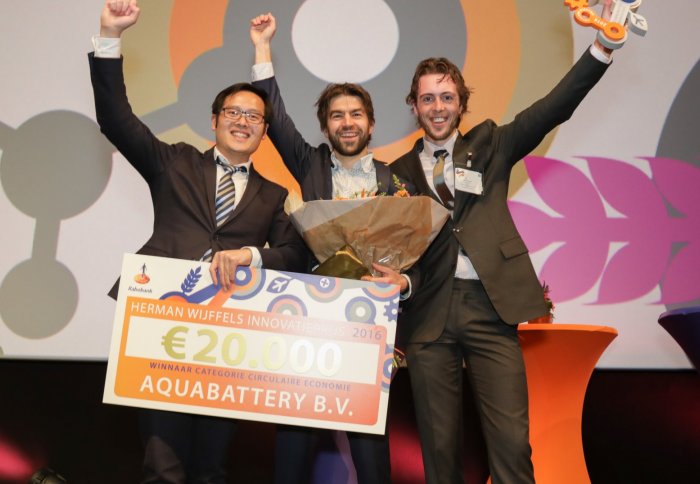Innovation award for renewable, safe and cheap energy storage technology

Chemical Engineering PhD researcher, Jiajun Cen, and his team of entrepreneurs have won a renowned innovation award for their Blue Battery invention
Congratulations to the AquaBattery team who have won the prestigious 2016 Herman Wijffels Innovation Award for their invention of a battery, termed Blue Battery, that can store electricity using only water and table salt.
Energy supply from renewable energy such as solar and wind, can be intermittent, and if the energy is not stored at the time of capture it will be lost. As we increase our energy supply from renewable sources this may lead to an unstable electrical grid and potential power outages. Batteries can address this problem. However, conventional batteries are toxic, expensive, and unsafe.
The Blue Battery is environmental friendly, affordable, safe and scalable. It uses abundantly available materials for energy storage (fresh water and salt), making it not only cheap, but also safe even in an unlikely event where there is spillage of battery fluid.

The start-up company that developed the technology, AquaBattery B.V., was co-founded by a team of engineers from around the world including Imperial College London Chemical Engineering PhD student Jiajun Cen. The company is currently in the Climate-KIC accelerator programme stage 2, where they aim to find a beachhead market for the product.
Jiajun Cen said, “Unlike other batteries, such as lithium-ion or redox-flow batteries, there are no chemical reactions involved. This makes our battery very safe! Moreover, abundantly available materials are used which allows us to build a really cheap battery. With further improvement of the technology and scaling up of the battery we can store electricity at an incredible price of <5 eurocents per kWh. As a co-founder I am very happy to see the company grow, and I am grateful for the support and freedom that Imperial and the Chemical Engineering Department have given me to further develop the Blue Battery technology while doing my PhD research.”
The team are currently working on building their first pilot scale system (1kW power and 10kWh energy storage capacity) in order to test whether the technology is commercially viable on a large scale.
Jiajun is a student on the Science and Solutions for a Changing Planet Doctoral Training Partnership programme, which provides students with the breadth of knowledge gained from attending bespoke training courses, events and participation in secondment opportunities designed to expand students’ horizons and awareness of how to tackle environmental issues.
Find out more about AquaBattery and their Blue Battery technology on their website or watch their promotional video (in Dutch). You can also follow AquaBattery on Twitter.
Images provided by Rabobank.
Article text (excluding photos or graphics) © Imperial College London.
Photos and graphics subject to third party copyright used with permission or © Imperial College London.
Reporter
Michael Panagopulos
Department of Chemical Engineering